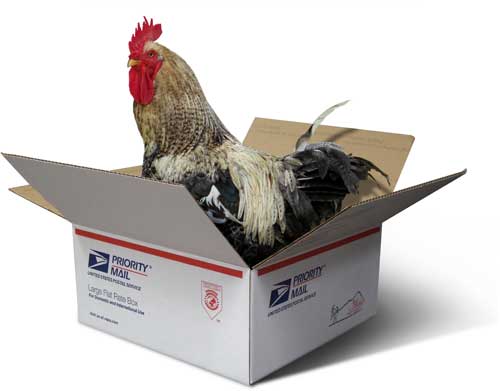n the wake of a major investigation that exposed hundreds of illegal cockfighting transports shipped from cockfighters in 15 states to Guam, Governor Lou Leon Guerrero of the Pacific Island territory announced that she’d confer with her legal advisors on the subject and decide whether to act on the request by Animal Wellness Action (AWA) to shut down import permits for this live contraband.
On Monday, AWA and its sister organization, the Animal Wellness Foundation (AWF), issued a letter to Guam’s Director of Agriculture describing our research findings – grounded on nearly 2,500 pages of avian shipping records formally obtained from Guam’s Department of Agriculture – that cockfighters from the U.S. mainland made more than 500 illegal transports of fighting birds to customers on Guam. The records reveal the illegal trafficking of nearly 9,000 birds to Guam alone in a 33-month period – translating into an illegal shipment, on average, every other day.
There were 71 people who exported cockfighting roosters to Guam during this period, with shippers from Oklahoma, California, Hawaii, North Carolina, and Alabama accounting for 75 percent of the 8,800 birds sent to Guam. The top five individual shippers accounted for 52 percent of all shipments.
Indeed, cockfighters make money by seeing their birds win fights, breeding those animals, and selling their offspring to other cockfighters. In that sense, it’s just like horse racing – if you have a winning horse, you breed the animal and sell the offspring. There’s a big difference though between cockfighting and horse racing: cockfighting is now illegal everywhere in the United States. And shipping fighting animals across any state or territorial line is a felony.
On December 20th, a federal law took effect that closed some loopholes in the Animal Welfare Act, forbidding animal fighting in every part of the United States, including the territories. That fortification of the law against dogfighting and cockfighting was built on a broad set of long-standing prohibitions. Since 2002, it’s been a crime – and a felony offense since 2007 – to transport fighting animals between the states or to the territories. Our investigation unearthed a criminal transport network blatantly subverting federal law, and we are bringing it to the attention of the authorities.
After synthesizing the information, we asked Guam’s Director of Agriculture Chelsa Muna-Brecht to revamp the live-animal clearance process and to instruct her staff to deny certification for any additional shipments of gamefowl, except in cases where the shippers and receivers can affirmatively demonstrate they are not involved in cockfighting.
The shippers typically mischaracterized the shipped birds as “brood fowl” or “show fowl” rather than fighting birds in order to try to skirt the federal animal fighting law. Our investigation – which included examination of industry sources, public media, and satellite imagery of shippers’ farms —makes it clear that dozens of shippers knowingly violated the federal law, in collaboration with the importers on Guam.
Cockfighters representing their shipments of fighting roosters as “brood fowl” or “show birds” is similar to drug traffickers shipping cocaine in the mail and claiming they’re just shipping baking soda or baby powder. Anyone who knows anything about this industry knows what’s going on. It shouldn’t take much deliberation in Guam to shut it down. The Department of Agriculture is abetting a felony offense if it persists in approving these shipments.
On Guam, there is no commercial poultry industry to speak of, and no competitions for show birds of any consequence on the island. Guam has, on the other hand, cultivated a robust cockfighting industry. These importers are paying hundreds for every rooster, and there’s just no other reason to make these kinds of payments unless you are deep in the industry. It doesn’t take great powers of deduction to figure this one out.
Cockfighters ship to cockfighters. Based on our investigation, we believe the people on both ends of these transactions are committing felony offenses. We found that cockfighters were using the U.S. Postal Service (USPS) for the transports, even though the Animal Welfare Act specifically prohibits the service from doing this work. We’ll be alerting the Postal Inspection Service, the USPS’s law enforcement arm, to the fraudulent, illegal use of the mail.
Some shippers are sending more than 100 cocks for every hen, and in nearly every case, the ratios are extraordinarily lopsided to favor the males. In a standard agricultural operation receiving birds for production, the ratios would be inverted, with more females used for breeding and egg production.
Cockfighting is not an industry Guamanians support. A poll conducted by Market Research & Development on Guam determined that 62 percent of Guamanians favor the federal ban on cockfighting.
In 2019, the Guam Cockfighting Licensing Board disbanded, abolishing any regulation of the industry. A District Court Magistrate Judge on Guam recommended denying a motion for preliminary injunction filed by a local cockfighting enthusiast seeking to enjoin enforcement of the law, and two months ago a U.S. District Court Judge in Puerto Rico rejected similar legal maneuvers by Puerto Rican cockfighting clubs.
The Guam Department of Agriculture’s authority to certify shipments amounts to actual authority, and it is not a perfunctory exercise in checking the box. It’s a responsibility of the agency not to ease the pathway for the movement of contraband onto the island.
Stopping these shipments is a clear-cut, cost-free way to enforce the federal ban on animal fighting. It doesn’t result in the imprisonment of any cockfighters or require any expenditures from Guam’s government. But it has the effect of stopping the flow of thousands of birds destined for illegal fighting pits.
Here’s the bottom line: federal law bans cockfighting. The courts have upheld the federal exercise of authority as constitutional. Elected and appointed officials should respect the law.
It’s no more complicated than that.
Please take action today and tell U.S. Attorney General William Barr to enforce animal fighting laws.
